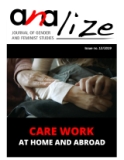“Geographies of Power”: Gender Role in Migration from Perspective of Care Work: The Case Study of Poland-Ukraine Border
“Geographies of Power”: Gender Role in Migration from Perspective of Care Work: The Case Study of Poland-Ukraine Border
Author(s): Lorenza PeriniSubject(s): Gender Studies, Labor relations, International relations/trade, Migration Studies, Geopolitics, Politics and Identity, Asylum, Refugees, Migration as Policy-fields
Published by: Societatea de Analize Feministe AnA
Keywords: “Geographies of Power”; Gender Role; Migration; Care Work; The Case Study of Poland-Ukraine Border;
Summary/Abstract: Within the theoretical framework proposed by Pessar and Mahler (2003) on the impact of the “geography of power” on gender relations in the processes of migration, the paper wants to highlight the importance of the process of negotiation of the gender relationships across national borders and how the interaction of this issue with other factors can contribute to shape migrants’ identities – especially of migrant women- as well as their living conditions. At the base there is the finding that, although –generally speaking- globalization means freedom to cross borders for capital and goods, the freedom of movement for people still depends on their place of birth and on their economic condition (Anderson 2000; Ehrenreich, Hochschild 2002). In this scenario, the research takes into consideration the case of Poland in relationship with Ukraine. As a former country of emigration, Poland is part of the global system but, starting from its entrance in the Schengen area, it is possible to observe how the rules of the “hierarchies of migration” are now working: Poland, in the last decades, instead of being a country of emigration, has started to become a country of immigration, capturing migrants from the other side of the border, particularly from those countries, like Ukraine, where the gap between the income level and the cost of living has become too huge to afford decent life conditions (Lutz 2008). The stereotyped figure of the woman seen as just a mother and as the only caretaker of the household and the family in catholic and traditionalist countries like Poland, is one of the central elements around which the research is built, reveling both the asymmetry between migrants and native women inside the “new” families and the problem of connection of the migrants women with their own “old” families abroad (Grzymała-Kazłowska 2001). In this sense, starting from the historical framework of traditional roles in the Catholic family, the research will examine the relationship between native women and migrant women in the framework of the “geography of power”, in which the elements that make up the border within and through which the analysis develops are represented by the legal / illegal dichotomies, Shengen / non-Shengen, and old / new migrations.
Journal: AnALize: Revista de studii feministe
- Issue Year: 2019
- Issue No: 13 (27)
- Page Range: 42-58
- Page Count: 17
- Language: English

